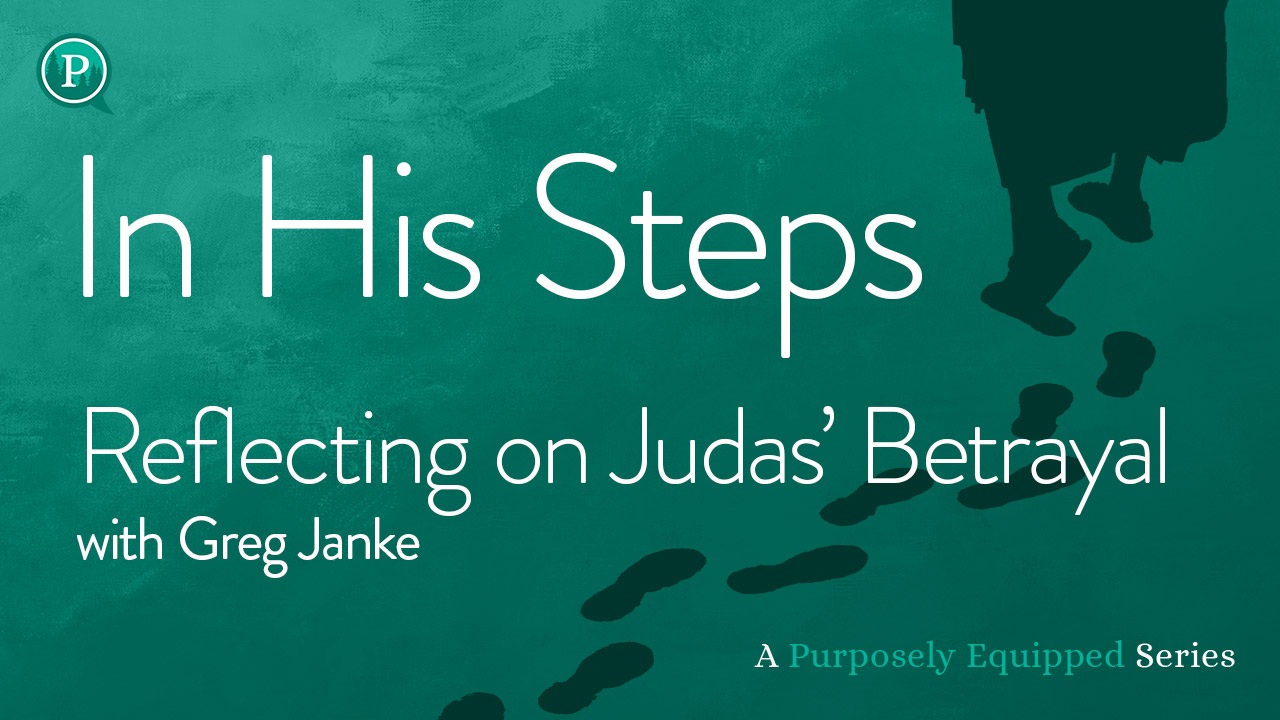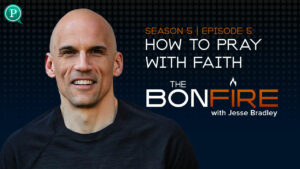In order to reflect on the betrayal of Judas, we need to look back at the story of Jesus as he spends time with Simon the leper. Pastor Greg Janke of Sonlight Community Church unpacks Matthew 26 for us as we look at the moment that Judas agrees to betray Jesus, what this means about Judas, and what this means about each of us.
Show Notes:
Sonlight Community Church in Lynden
Transcription:
Purposely your life, God’s purpose. Listen at onpurposely.com. In His Steps, a Holy Week journey.
Mark Holland:
And on we go In His Steps. We’re up to day number four in this series of discussions with pastors about what’s known as Holy Week. And we have another pastor with us once again talking about the day four in Holy Week when the chief priests and elders teamed up with Judas and agreed to betray Jesus. But before we get to that heavy subject, we are talking with another pastor, pastor Greg Janke from Sunlight Community Church in Lynden. Hi there, pastor Greg.
Greg Janke:
Hi Mark. How are you?
Mark Holland:
Really good to have you on the line. You are recording this in our studios in Bellingham at Praise 106.5. Unfortunately we can’t see each other. I thought we’d maybe everybody wants to take a break from Zoom. They don’t want to see each other’s. We both have faces for radio though, so we’re okay with this. And hey, before we absolutely get into our discussion today, I wanted you to tell us a little bit about your involvement there with Sunlight Community Church, how long you been there?
Greg Janke:
I have been at Sunlight just since last September. I had arrived there in September after serving a church in the Chicago area for about 12 years and some other churches before that. So only been here in the Pacific Northwest for a little bit, but really enjoying it, enjoying the area, enjoying the people I’ve met, enjoying the opportunity to serve here in the great Pacific Northwest.
Mark Holland:
Well a little bit milder temperatures here in the northwest, although we do seem to be having a little bit more weather than we’re used to. Hey, did you bring a family with you?
Greg Janke:
Yeah, well just my wife. All of our children are adults and live in other parts of the country. So it’s just my wife and I who moved out here.
Mark Holland:
Well, I know this is a time of year when pastors are really getting ready for some of the, I don’t know if it’s the second biggest day of the year. Christmas is big, Easter’s big. We want to see as many people come out to church as possible. We’ll get more details about how people can visit your church there at Sunlight Community Church here in just a couple of minutes. But we have you on to talk about day number four as we journey in the steps of Christ what’s come to be known as Holy Week. And tell us a little bit about your first impressions of what this day is about the chief priests and elders teaming up with Judas.
Greg Janke:
Yeah, as I think about the flow of Holy Week begins, of course, with the Jesus coming into Jerusalem, visiting the temple, going back out to Bethany, and then the following day coming in and that big scene of clearing the temple of the merchants. And sometime after that we have the events that lead to the betrayal where Judas visits the chief priests and agrees to turn Jesus over to them. But that event is really something that is rooted in something that happens actually before Jesus comes in on what we call Palm Sunday, that big triumphal entry.
Mark Holland:
How is it rooted in that other event? What is the other event?
Greg Janke:
Well, if you look at, say Matthew 26, but the other gospels reflect this as well, that it actually says six days before the Passover. So this would’ve been like Friday night before the Passover or Thursday, Jesus is in Bethany at the home of Simon the leper. And it’s at that dinner meeting that Mary comes and anoints Jesus with some incredibly expensive perfume. This really amazing, elaborate, extravagant anointing of Jesus with perfume that we’re told costs a year’s wages. And it’s that event that triggers that serves as the trigger for Judas to go forward then and meet with the chief priest and betray Jesus.
Mark Holland:
Why now? Why do you think that was such a turning point for Judas?
Greg Janke:
That’s a really interesting question. So if you read the story, the other gospels indicate that it’s only Judas that was upset about it. But if you read the Matthew version, Matthew says, the disciples were upset about this. So it’s not just one, but it’s all of them. But for some reason, Judas is the one whose whatever misunderstanding or frustration, whatever it was that he was feeling triggers something deeper and then his desire to go forward and betray Jesus. But it seems to be rooted in the extravagance of the event, that extravagant use of the perfume we’re told that Judas thinks, but also the disciples seem to think that the better use would’ve been to sell it. It could have helped so many more people could have helped the poor in some fashion, but Jesus just sits there and allows her to pour this out over him and anoint him in this way.
Mark Holland:
It’s interesting, Judas, the portrayals of Judas we’ve seen in popular culture and movies, they often portray him as maybe the most educated, one of the bunch who is maybe the most business savvy and often they portray him, I should say, as being kind of a sympathetic character that was misunderstood. Do you think Judas was a misunderstood character?
Greg Janke:
That that’s again a really interesting question because if you look at the way he’s portrayed in the gospels, there’s no previous event or occurrence that would make us think that he’s going to be the one who will betray. He’s always listed among the 12 disciples. He’s always listed last and usually with the appellation that he was the one who betrayed Jesus. But remember the gospels were written long after the events that they recorded, and so there’s some reflection and there’s an opportunity to do that. But he was the treasurer of the group. We know that from some places where even at the last supper when he leaves and the other disciples think, well, he’s the treasurer, maybe he’s going out to make a donation to the poor or something like that.
And he remains. So if you think about a story that occurs earlier in John chapter six, when John chapter six records that because of some of Jesus’ difficult teachings, other disciples begin to fall away. Judas is part of the group that remains so, he’s loyal to Jesus. He does, doesn’t seem to give any indication that he’s untrustworthy anything like that until we hear some events around Holy Week where he’s upset that Mary didn’t sell the perfume because he handled the money bag and he helped himself to some of the stuff in the money bag, which reflects poorly on his character. But until that moment, nothing else is said.
Mark Holland:
Yeah, he’s an interesting character and Jesus knowing everything knew which one was going to betray him, but he chose him to be one of the 12 anyway. Ts gets into a lot of kind of heavy theological ideas. Did Judas have a choice because somebody had to betray Jesus? Right. Do you have any thoughts about things like that, how sometimes people are chosen by God for good things and bad things?
Greg Janke:
Well, I think that’s one of the important things to keep in mind about within this whole story is that God is one who’s controlling the events here. What happens to Jesus is not happenstance, it’s not an accident. God is the one who’s leading and guiding and directing this throughout. And so it’s interesting, again, going back to the story of Matthew 26, at the very beginning of Matthew 26, Jesus himself talks about being handed over to be crucified. And that’s an important theme through Matthew’s telling of the passion story. He keeps repeating the phrase handed over, and God is the one who ultimately is handing Jesus over to be crucified. And then Jesus himself says, I am being handed over. And so they’re the ones who are first and foremost, the primary actors in this, which isn’t to say that Judas is an accidental character. He’s fully responsible for what he does, but what he’s doing is ultimately being guided and directed by the Father’s plan.
Mark Holland:
Yeah. People always think Jesus was whipped up on and he was just a victim, but he knew very much right from the start what his mission was. And none of this was a surprise to him. It was hard, hard to go through it, but he wasn’t surprised. He knew that this was according to God’s plan.
Greg Janke:
Exactly. And he willingly chose this road and did so again and again and again for us, for our benefit and blessing.
Mark Holland:
Why do you think getting back to those chief priests and elders, it seemed to be the main people in his ministry he had the most problem with. What was Jesus doing, you think that got them so upset?
Greg Janke:
Yeah, that’s a really interesting question. When you look at the gospels throughout Jesus’ ministry, it’s primarily the Pharisees, the teachers of the law. They’re the ones who are sort of serve as the foil within his ministry. But when we get to the passion, it’s the chief priests and the elders who come to the fore. They’re the religious leaders. They’re the ones who sort of represent the religious establishment and authority. The chief priests following the exile, the chief priests became both the religious authority and the primary political authority among the Jews. And so Caiaphas at this time, and before him, his father-in-law, Annas, was sort of both priest and king. They had sort of that dual function. And so Jesus was an extreme threat to their power, their authority, their place in society, because if Jesus is who he claims to be and who people are claiming him to be, which is the Messiah, then that would mean that the chief priest was no longer the king, no longer the supreme political authority. And so his position within the community was being threatened.
Mark Holland:
So it was more than just profound theological differences or anything like that. It was more of a kind of gut level you’re challenging our power,
Greg Janke:
To be honest. I mean, I’m sure that there was some theological difference because they also were the ones who said, Hey, the Messiah doesn’t come from Nazareth and so on. But really, I think at its core, it was a very, very human desire to preserve power and position, and that’s what motivated them.
Mark Holland:
Do you think we, as Christians maybe who are listening to this today, we can take some warning from this because sometimes we think we’ve got it all down and we’ve got God figured out and God wants to maybe do a new thing or kind of come out from left field are challenged this way as Christians even in our lives today, do you think?
Greg Janke:
Oh, I think absolutely. When you look at all the characters in this particular story, most of the time I suspect Christians would look at this and say, well, I’m not Judas. I’m certainly not the chief priest. So I’m just kind of a passive observer of this. And when we do that, we miss some of the power of the story and power of what’s happening here, because we don’t see ourselves as someone who betrays the power of Jesus or who minimizes what Jesus wants to do. I mean, one of the speculations that people make about Judas in terms of what motivated him is that he disagreed with Jesus’ idea of what the Messiah was going to be. And when it became clear that Jesus was not going to take the reins and claim civil authority and the like, that that’s what motivated Judas to act. Well, I think in some ways we can be very guilty of limiting what Jesus wants to do in our own lives or in the lives of other people. And in that way denying his full power, full authority, and betraying what he intends to do in the world and in our lives.
Mark Holland:
Well, they all were looking, not just Judas, but all of the disciples were looking for Jesus to be that conquering Messiah who’s going to set up the kingdom on earth. And it only during this holy week started to make sense to them that wow, Jesus had a whole different plan, and they were all challenged by that. It wasn’t just Judas who betrayed Jesus. Really. They all did.
Greg Janke:
Exactly. When they began to see the cost of what Jesus was calling them to be and to do, when they began to recognize exactly what Jesus’ ministry and mission were all about, they all ran away. They all deserted Jesus. And in that sense, all betrayed him. But then Jesus comes back to them to the 11 and welcomes them back. Certainly does that deliberately and intentionally with Peter. But Peter represents all of them and sends all of them out to be his missionaries. Sends all of us out to do that.
Mark Holland:
And you’ve been listening to the purposely equipped series called In His Steps, a Holy Week Journey, and you’ve been listening to Pastor Greg Janke of Sunlight Community Church in Lynden. Find out more about them online at sunlightchurch.com. Please leave us a review of this message so more people can discover this podcast and find more episodes of Purposely equipped,, at onpurposely.com.







